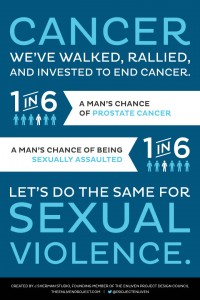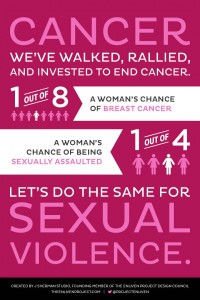
Sexual assault* is being discussed publicly now more than ever, and with the president’s task force to combat on campus sexual assault as well as several lawsuits against universities under Title IX for mishandling sexual assault reports from students, the focus is more intense. Sexual assault and gender-based violence as a whole is a public health crisis in the United States, and people are starting to notice. It is amazing progress that people are starting to discuss sexual assault on facebook, among friends, and in major news outlets, and we need to keep that momentum going with concrete action. While we need to work on prevention with people of all ages, including those in high school, the high rates and mobilization of activists on college campuses has brought that environment to the forefront. For those colleges and universities looking to make a real difference, here is my advice on how to reduce sexual assault and its harmful effects on campus.
- Train RAs in bystander intervention and receiving disclosures. This will enable them to step in when they see an unsafe situation, and better prepare them if a student discloses to them that they have been assaulted. Disclosure training helps a person understand the possible needs of a survivor**, how best to speak with them, which resources are available, and how to quickly ensure the safety of the survivor and connect them to resources, like medical advocates, SANE nurses, counseling, legal assistance, and university-related assistance. If your school is in the Boston Area, get in touch with the Boston Area Rape Crisis Center (BARCC) about their trainings.
- Train campus security, police, health services, and any other personnel who are likely to receive disclosures. Personnel should be well-versed in all the options and resources available to a survivor, the proper way to treat and speak to a survivor.
- Have a dedicated office to prevent sexual violence. This office should be staffed with people from the world of victim services and victim advocacy, and their professional guidance should be sought after and respected to improve university disciplinary and judicial practices, resources available to survivors, and campaigns to combat sexual assault. They should have a reasonable budget and a high level of access to information and the ability to influence practices on campus.
- Require all incoming freshmen to pass an exam on consent and resources, just as most universities require all incoming freshmen to pass an exam on alcohol and its effects.
- Speaking of consent: update your definition in your code of conduct, judicial materials, on campus resources and the exam to reflect that all sexual acts are opt-in, not opt out. Silence does not equal consent. We should not be lowering the bar on consent but raising it, to enthusiastic consent. Consenting once does not mean you consent forever, or even for the next five minutes; a person is entitled to change their mind at any time and have that respected. Consenting to one person or to one sex act does not have any bearing on whether that person consents to any other sex act or to be with any other person, or even with that same person again. Those who are intoxicated cannot consent.
- Update your definition in your code of conduct, judicial materials, on campus resources and the exam to accurately reflect what sexual assault can look like, and update on campus attitudes about sexual assault as well. Sexual assault does not have to involve a weapon or even violence. All it takes is the threat of violence, and that threat can be communicated non-verbally. It is sexual assault to coerce a person into sex, whether by quid pro quo, verbal threats, or merely persisting until a no becomes a yes or silence. Silence is not consent; a coerced yes is not really a yes.
- Work with other universities to establish best practices, like the upcoming conference Dartmouth is hosting this summer. There should be representation of victims’ rights advocates, medical advocates, law enforcement, and survivors at that conference to give their valuable input. That input needs to be prioritized over other concerns like the reputations of colleges or the financial cost of these measures. That Title IX money isn’t for free.
- Report all data as required by the Clery Act in a timely and accurate manner. Sadly, not all schools are living up to this law. We all have a right to know about the rate of sexual assaults on campus, and it is illegal for universities to alter or delay the data.
- Cooperate fully with law enforcement and legal entities if the survivor chooses to seek legal action such as prosecution or a restraining order. Many universities have not been cooperative in the past, or have attempted to keep assaults from reaching law enforcement in an attempt to protect their own reputation. This is reprehensible.
- Offer the survivor all options available to them, and let them decide. Do not tell them it will make their life miserable or no one will believe them, or that it would be better for everyone if they just let it go or took time off. Do not attempt to coerce or influence them in any way. Sadly many universities have done this in the past (and likely still do this) in order to protect their reputation, and several are currently being sued under Title IX for this exact problem.
- Make campus safe for the survivor as quickly as possible. This can include anything from moving the attacker to different housing, switching the attacker’s classes, to suspending or expelling them from campus. The attacked should be the one whose life has to change to accommodate the health and safety of the survivor, not the other way around, and these changes need to happen swiftly.
- Do not turn a sexual assault into a “teaching moment” for the perpetrator. Their rights are not more important than the rights of the person they violated. While the percentage of men who commit sexual assault is quite low, two-thirds of those who do commit the crime on college campuses do so almost six times on average. David Lisak’s research shows that undetected rapists, “plan and premeditate their attacks, using sophisticated strategies to groom their victims for attack, and to isolate them physically.” This is not an issue of mere misunderstanding, contrary to the implications of the term “date rape.” The university punishment for sexual assault should be at least as harsh as punishments for underage drinking, drug possession, hazing, and non-sexual violence. At many schools this is not the case and perpetrators, even when found at fault, get off with a slap on the wrist.

Other, less concrete actions are also necessary. Colleges and universities need to recognize other behavior on the continuum of gender- and sexuality-based violence and get proactive, such as by ridding their campuses of sexual harassment, street harassment, and misogynist events or attitudes on campus. Students and on-campus groups should not be allowed to make shirts depicting women as pigs on a spit, or gather in groups to chant degrading things at women. A community that does not tolerate degrading behavior that is considered non-violent is a less welcoming place for perpetrators. Moreover, a community that fosters open discussion on these issues, such as in town hall meetings, student and faculty senates, school publications, and by hosting relevant on-campus events is a community that actively wants to improve safety for all of its members.
We are a long way from eradicating this crime and its widespread affects, but if we want to get serious about ending sexual assault, it’s time we focus on all aspects of this public health epidemic and get down to business. Universities have at times been progressive leaders in this country, on the cutting edge of doing the right thing. It’s time they live up to that reputation and prioritize the people within their communities over alumni donations and their reputation. Personally, I think universities that take effective, proactive measures will be rewarded, as our culture has recently shown that we are no longer willing to ignore this crisis.
What measures have I forgotten to include? Do you know of any campuses doing a particularly good job, in one area or another?
*I use the terms sexual assault here to encompass all manner of sexual crimes, including rape. Personally I find the distinction between whether someone penetrated a person while they performed sex acts on them without their permission to be an artificial one, used by antagonizes (and survivors themselves) to attempt to downplay the serious nature of the crime.
**I use the term survivor where most newspapers, universities, and lay people would use the term victim. It comes from the community of people who have experienced these crimes and those who advocate for them. There is already enough dis-empowering messaging in discussions of sexual assault, making the empowering term “survivor” preferable. A victim is a passive person in a crime. A survivor is someone who has actively striven to make it through something horrific, which is an accurate depiction of every survivor I’ve ever met, and more accurately reflects the on-going nature of recovery. Not everyone self-identifies with this term and it is best to honor their wishes on an individual basis, but when speaking in broad terms I prefer to use the term survivor.
***Top image CAROLYN KASTER/ASSOCIATED PRESS
